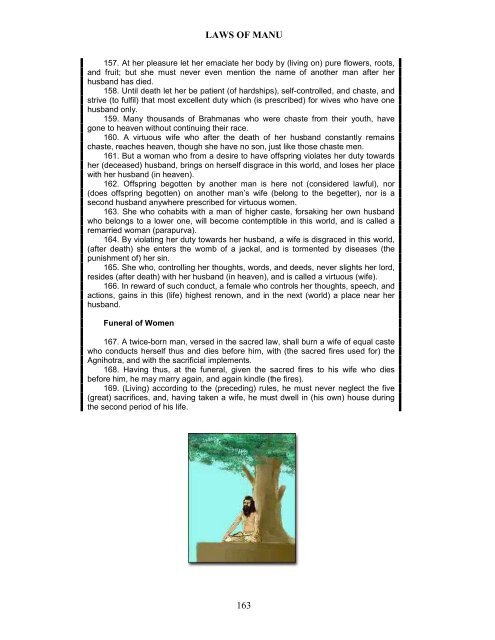You also want an ePaper? Increase the reach of your titles
YUMPU automatically turns print PDFs into web optimized ePapers that Google loves.
LAWS OF MANU<br />
157. At her pleasure let her emaciate her body by (living on) pure flowers, roots,<br />
and fruit; but she must never even mention the name of another man after her<br />
husband has died.<br />
158. Until death let her be patient (of hardships), self-controlled, and chaste, and<br />
strive (to fulfil) that most excellent duty which (is prescribed) for wives who have one<br />
husband only.<br />
159. Many thousands of Brahmanas who were chaste from their youth, have<br />
gone to heaven without continuing their race.<br />
160. A virtuous wife who after the death of her husband constantly remains<br />
chaste, reaches heaven, though she have no son, just like those chaste men.<br />
161. But a woman who from a desire to have offspring violates her duty towards<br />
her (deceased) husband, brings on herself disgrace in this world, and loses her place<br />
with her husband (in heaven).<br />
162. Offspring begotten by another man is here not (considered lawful), nor<br />
(does offspring begotten) on another man’s wife (belong to the begetter), nor is a<br />
second husband anywhere prescribed for virtuous women.<br />
163. She who cohabits with a man of higher caste, forsaking her own husband<br />
who belongs to a lower one, will become contemptible in this world, and is called a<br />
remarried woman (parapurva).<br />
164. By violating her duty towards her husband, a wife is disgraced in this world,<br />
(after death) she enters the womb of a jackal, and is tormented by diseases (the<br />
punishment of) her sin.<br />
165. She who, controlling her thoughts, words, and deeds, never slights her lord,<br />
resides (after death) with her husband (in heaven), and is called a virtuous (wife).<br />
166. In reward of such conduct, a female who controls her thoughts, speech, and<br />
actions, gains in this (life) highest renown, and in the next (world) a place near her<br />
husband.<br />
Funeral of Women<br />
167. A twice-born man, versed in the sacred law, shall burn a wife of equal caste<br />
who conducts herself thus and dies before him, with (the sacred fires used for) the<br />
Agnihotra, and with the sacrificial implements.<br />
168. Having thus, at the funeral, given the sacred fires to his wife who dies<br />
before him, he may marry again, and again kindle (the fires).<br />
169. (Living) according to the (preceding) rules, he must never neglect the five<br />
(great) sacrifices, and, having taken a wife, he must dwell in (his own) house during<br />
the second period of his life.<br />
163


















